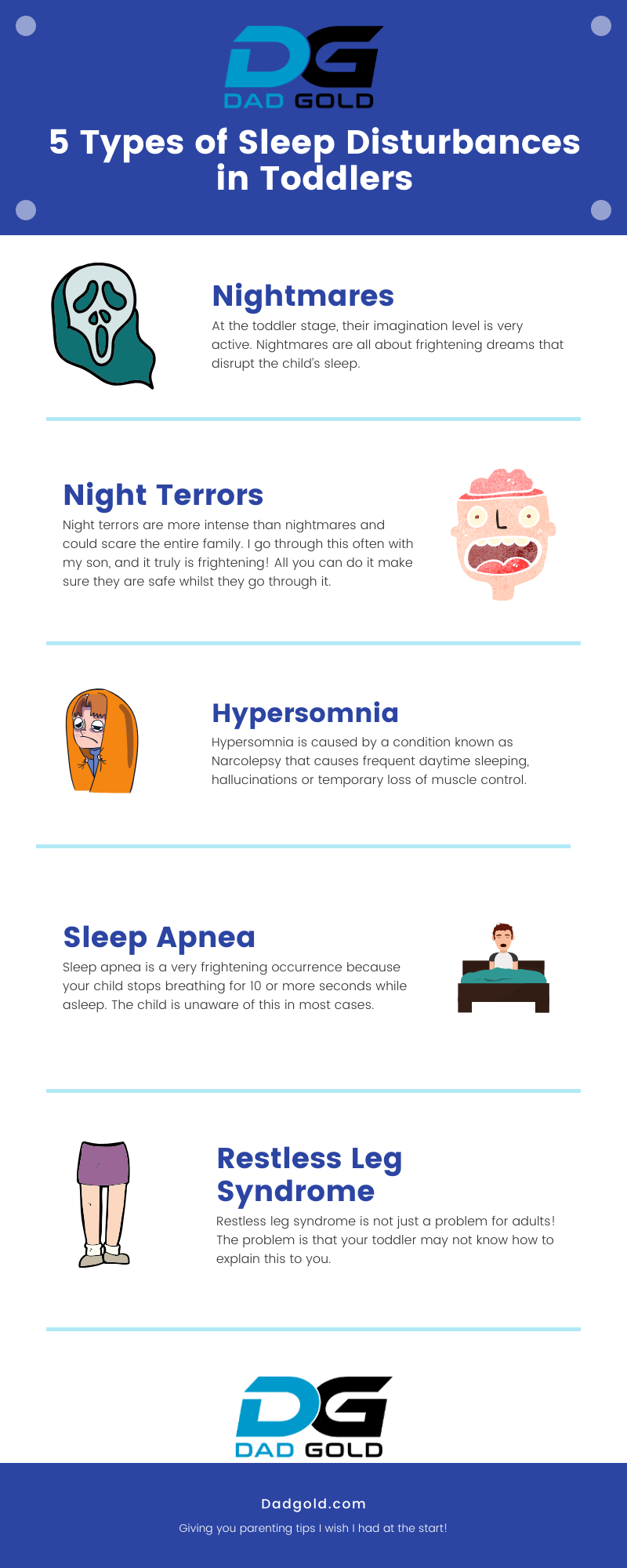There are several causes of sleep disturbances in toddlers and children in general. First, it could be a result of the changing body and mind. Nightmares, night terrors (my son has these), separation anxiety where they may want to cuddle all through the night.
There are many causes of sleeping disturbances depending on the child or the type of disturbance they are experiencing. This post will take you through what causes sleep disturbances in toddlers, different types of sleep disturbances, and how you can help overcome them.
Ultimately, you want a good night’s sleep. I mean, that is the crux of the issue! It is for me.
5 Types of Sleep disturbances in toddlers
Here are the most common sleep disturbances.

1. Nightmares
Nightmares are common for everyone. Okay, they upset toddlers much more than they would upset a fully grown man, but still, I don’t think they ever stop.
At the toddler stage, their imagination level is very active. Nightmares are all about frightening dreams that disrupt the child’s sleep.
When nightmares happen, the toddler becomes aware of their surroundings and may wake up their parents seeking comfort. Nightmares occur during rapid eye movement (REM), a stage of sleep that happens approximately every 90 minutes. You can do nothing except be wary about what they watch on TV or a tablet!
Why do toddlers cry when they wake up? Well, it could be nightmares or even night terrors; see below.
-

Bold Male Pride – Baseball Trucker Cap Celebrating Masculinity
£18.00 Select options This product has multiple variants. The options may be chosen on the product page -

Dad Bod Appreciation Gift Mug
£14.00 Add to cart -

Dad Bod, Bad Jokes Structured Baseball Cap
£22.00 Select options This product has multiple variants. The options may be chosen on the product page
2. Night Terrors
Night terrors are more intense than nightmares and could scare the entire family.
They are very common in toddlers and cause them to wake up agitated or scared suddenly from sleep. In most cases, the baby wakes up yelling, crying, or even sleepwalking in some cases. They do this without knowing, and they are, in most cases, not awake, so they may not even remember this episode when they wake up.
Night terrors occur from 90 minutes after the child falls asleep. This period is known as non-rapid eye movement (non-REM) sleep. There is no actual remedy for night terrors, but you could minimize their chances of occurring by sticking to a certain sleep schedule.
My son has night terrors, and they scare the hell out of me! After a night terror he would sleep more than usual, which would also mess up his sleep pattern.
3. Hypersomnia
A child with hypersomnia experiences excessive daytime sleepiness.
Hypersomnia is caused by a condition known as Narcolepsy that causes frequent daytime sleeping, hallucinations, or temporary loss of muscle control.
Excessive daytime dozing is also a sign of epilepsy, concussion, or other medical conditions. In addition, the child needs to be carefully diagnosed to identify the best hypersomnia treatment.
4. Sleep Apnea
Sleep apnea is a frightening occurrence because your child stops breathing for 10 or more seconds while asleep. The child is unaware of this in most cases.
When your toddler has sleep apnea, you may notice excessive dozing during the day, loud snoring, and breathing with their mouth while asleep.
It is essential to see a doctor immediately after you notice this happening to your child. Sleep apnea can lead to behavior and learning issues or even go as far as causing heart issues.
5. Restless Leg Syndrome
Folks believed that restless leg syndrome used to be an adult problem, but research has it that sometimes it starts at an early age.
Your child may complain of having the sensation of bugs crawling on them and may twist and turn in bed seeking comfort.
Some children may not even notice that they are uncomfortable, but they experience poor sleep. In case your toddler experience this, see a doctor asap for treatment.
How to help a toddler with sleep disturbances

There are several ways you can help your toddler have enough sleep. When you are setting up their bed routine, make sure you do the following:
Stick To The Daily Nap Time
Stick to the same sleeping and waking time every day. Make sure that you also stick to the daily nap time. It should not be too short, and neither should it be late in the evening.
The two could deny your toddler a good sleep at night.
Create and Maintain a Schedule
Make sure you stick to a consistent sleeping schedule every day. Introduce an enjoyable activity to do 30 minutes before sleeping time. For example, it could be bathing the child, singing a song, or soothing them down with bedtime stories.
It is also worth investing in a night projector! This really helped my son drift off to sleep each night.
Check The Room Temp
The bedroom atmosphere should be cool, quiet, dim or dark, and comfortable to sleep in. It is okay to have soft, smooth music playing in the bedroom.
Please do not allow the child to use the bed as a platform for playing; you should only use it for sleeping purposes.
Any watching or gaming should not be encouraged in bed.
Shut down all the devices such as TV, smartphones, or iPad and keep them far from the bedroom. Such devices could keep the child from sleeping.
No Food Or Drinks Before Bed – Especially Sugar!
Before bedtime, food and drinks should be limited, especially those that contain a lot of sugar.
Keep in mind that a lot of drinks contain sugar. So it is good to check the label before giving any drink to your toddler.
Teach Them To Self Soothe
Teach your child to fall asleep on their own. You may tuck them in bed in a sleepy but comfortable state. This helps them fall back to sleep on their own if they wake up at night.
Toddlers learn to self-soothe over time. It is a long journey, but they do get there in the end!
Give Comfort
For preschoolers, in case of nightmares or sleepwalking, we should comfort them immediately.
Return them to bed once they fall back to sleep. Use a soft blanket, stuffed animal or soft pillows to surround the child for comfort.
This may assist them to fall back to sleep again without having to call out for the parents.
I also know (from experience) that it is very tempting to pick them up and take them into your bed. It is a great idea to get back to sleep again, but it could lead to your toddler always wanting to sleep in your bed.
Conclusion
Sleep is essential to everyone, especially to the little beings who require quality and adequate sleep for their healthy growth. Parents should familiarize themselves with the causes of sleep disturbances in toddlers and how to deal with them.
Therefore, you must address sleep disorders immediately after they are noticed. Once you spot any of the above-mentioned problems, try to make adjustments seek a doctor’s treatment, advice, or therapy to have these problems sorted out.
Good luck!

